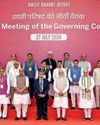
Every breath you take, depending on where you take it, is poisonous in varying degrees.
Five years after the country launched its National Clean Air Programme, it is distressing to note that even in cities that have seen the greatest improvement in Air Quality Index (AQI), the air still falls in the ‘moderately polluted’ category. The National AQI describes this bracket as one that “may cause breathing discomfort to people with lung disease such as asthma, and discomfort to people with heart disease, children and older adults”.
Air pollution, despite its ascendancy in public consciousness, remains a partially understood challenge. No, it is not limited to the winter months. No, it does not assume monstrous proportions only in north India. No, it is not an urban curse. And a big no for believing that it only affects lung health.
One of the most alarming impacts of air pollution is on fertility—the ability to conceive a child. This is an effect that transcends individuals and generations, for it can and will lead to disastrous demographic consequences.
A decline in fertility and a global increase in life expectancy equal a rapidly ageing world population, thus precipitating a series of problems such as labour shortage and heightened financial pressure. While multiple factors like more women getting education and entering the workforce, social acceptance of late marriage, overall health condition, body weight, nutrition and choice play a role in fertility, the challenge is to tackle avoidable factors, including pollution, for those who want to have children.
This story is from the April 07, 2024 edition of THE WEEK India.
Start your 7-day Magzter GOLD free trial to access thousands of curated premium stories, and 9,000+ magazines and newspapers.
Already a subscriber ? Sign In
This story is from the April 07, 2024 edition of THE WEEK India.
Start your 7-day Magzter GOLD free trial to access thousands of curated premium stories, and 9,000+ magazines and newspapers.
Already a subscriber? Sign In

Doctor's doctors
Internists deal with prevention, diagnosis and treatment of all kinds of diseases, while also coordinating with doctors across specialties

WORK THIS OUT!
What is the true cost of a 90-hour workweek? Reduced productivity, mental health issues and severe health risks, say doctors

The experience of oppression
The British enacted several laws that might appear liberal, only to then veto the invocation of progressive measures. Nevertheless, these milestones guided the founding fathers in conceiving and creating the Constitution of India

One, two, buckle my shoe!
“Darling,” I said to my life companion of more years than I care to remember, “Do you think there is any correlation between pain in the feet and attending prayer meetings?”“You really are a stupid old man!” said the light of my life. “Can’t you think of anything more bizarre so late at night?”

A helping hand
Over the past year, Imaginarium has placed 3D-printed parts in space, in human bodies, in oil fields in the Middle East, and as drones on the Indian border

Fading federalism
One of the most visible indicators of the erosion of state autonomy is the diminishing financial independence of states

FOUNDING MOTHERS OF THE CONSTITUTION
THEIR CONTRIBUTION IN THE MAKING OF THE REPUBLIC REMAINS EXEMPLARY AND INSPIRING

Value every breath
VO2 max is the best way to measure fitness and predict life expectancy

Statutes of unity
The Constitution reminds us that national oneness comes through addressing inequalities, not enforcing uniformity

Incomplete equality
Equal marriage rights is one of the last bastions of patriarchy and to dismantle it, the recognition of marital rape as an offence is non-negotiable